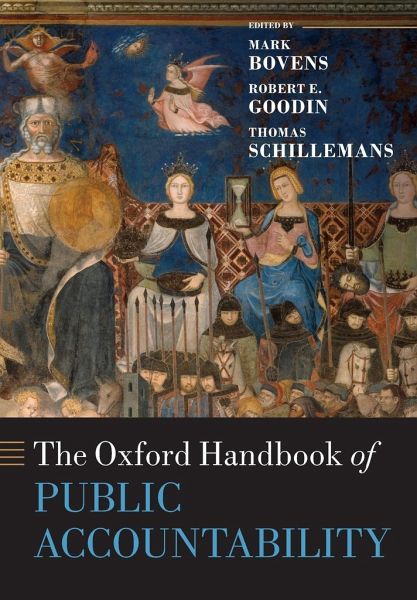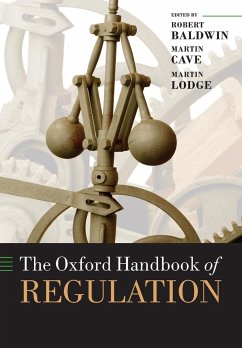
Broschiertes Buch
The Oxford Handbook of Public Accountability
Versandkostenfrei!
Versandfertig in 1-2 Wochen

PAYBACK Punkte
31 °P sammeln!




Drawing on the best scholars in the field from around the world, The Oxford Handbook of Public Accountability showcases conceptual and normative as well as the empirical approaches in public accountability studies.
Mark Bovens is a political scientist and lawyer by training. He is Professor of Public Administration at the Utrecht University School of Governance, which he co-founded in 2000. As of 2013, he is a member of the Dutch Scientific Council for Government Policy (WRR) in The Hague, the strategic think tank of the Dutch cabinet. He has published 24 monographs and edited volumes and over a hundred articles and chapters in the areas of politics, government, and legal theory. He is an internationally well-known expert in the field of accountability studies and has published a number of seminal books and papers on the topic (eg: The Quest for Responsibility: Accountability and Citizenship in Complex Organizations, CUP 1998; The Real World of EU Accountability: What Deficit?, OUP 2010). Robert E. Goodin is a philosopher and political scientist. He is a Distinguished Professor of Social & Political Theory and Philosophy in the School of Philosophy at Australian National University, as well as Professor of Government at the University of Essex. A Corresponding Fellow of the British Academy, Goodin is founding editor of The Journal of Political Philosophy and of the Cambridge University Press series of books on 'Theories of Institutional Design'. He served as general editor of the eleven-volume series of Oxford Handbooks of Political Science. His own work straddles democratic theory (e.g. Reflective Democracy, OUP 2003), empirical welfare-state studies (e.g., The Real Worlds of Welfare Capitalism, CUP 1999; Discretionary Time, CUP 2008) and theoretical reflections on public policy (e.g., Social Welfare as an Individual Responsibility, CUP 1998; What's Wrong with Terrorism? Polity 2006). Thomas Schillemans is a public administration scholar. He received his PhD with honors in 2007 for his thesis on Horizontal Accountability in the Shadow of Hierarchy. His working experience includes seven years at the council for social development, an advisory body of the Dutch government. His research aims to make sense of dispersed practices of governance through empirical studies that examine the interactions of executive agencies, regulators and nonprofit organizations with relevant stakeholders: clients, professional peers and the newsmedia. Public accountability is a key concept in his work. He is assistant professor at the Utrecht University School of Governance.
Produktdetails
- Oxford Handbooks
- Verlag: OUP Oxford / Oxford University Press
- Seitenzahl: 734
- Erscheinungstermin: 2. Juni 2016
- Englisch
- Abmessung: 244mm x 170mm x 39mm
- Gewicht: 1270g
- ISBN-13: 9780198778479
- ISBN-10: 0198778473
- Artikelnr.: 44492630
Herstellerkennzeichnung
Libri GmbH
Europaallee 1
36244 Bad Hersfeld
gpsr@libri.de
Für dieses Produkt wurde noch keine Bewertung abgegeben. Wir würden uns sehr freuen, wenn du die erste Bewertung schreibst!
Eine Bewertung schreiben
Eine Bewertung schreiben
Andere Kunden interessierten sich für











